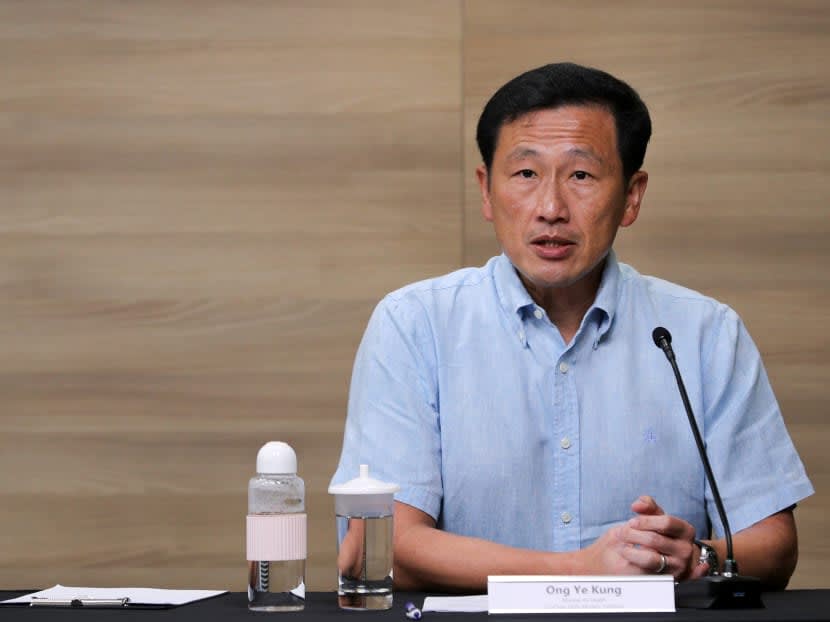Current Covid-19 wave not as severe as Omicron outbreak in early 2022: Ong Ye Kung
SINGAPORE — Health Minister Ong Ye Kung said on Tuesday (July 5) that the current Covid-19 wave would not be as severe as the Omicron wave earlier this year due to "stronger immunity either through booster shots or recovery from infections".

- Stronger immunity against Covid-19 will significantly impede its circulation and spread, Health Minister Ong Ye King said
- This could be either through vaccine booster shots or recovery from infections
- He said the BA.4 and BA.5 sub-variants of the coronavirus account for half of the week's infection, with BA.5 being the more dominant one
- Community treatment facilities now have 1,300 beds and a quarter of these are occupied
- In preparation for the infection wave, hospitals have made a cutback of 700 beds, or 4 per cent of the beds for non-Covid patients
SINGAPORE — Health Minister Ong Ye Kung said on Tuesday (July 5) that the current Covid-19 wave would not be as severe as the Omicron wave earlier this year due to "stronger immunity either through booster shots or recovery from infections".
Speaking in Parliament in response to several questions on the topic from various Members of Parliament (MPs), Mr Ong added that the slowdown in the infection rate is a sign that the wave is at or near its peak.
Case numbers by the end of Tuesday were expected to be more than 12,000, which is a "tad higher" than Tuesday last week when the number was 11,504, he noted.
"So there are indications that we are near the peak, if not at the peak. And we should be relieved that the number this week did not double from last week. Otherwise, we will be at 24,000 or 22,000 this week."
“So there are indications that we are near the peak, if not at the peak. And we should be relieved that the number this week did not double from last week. Otherwise, we will be at 24,000 or 22,000 this week.Health Minister Ong Ye Kung”
Mr Ong said that in South Africa, the second Omicron wave driven by sub-variants BA.4 and BA.5 was about one-third the peak of the earlier Omicron wave.
"We anticipated this wave when we learnt about sub-variants BA.4 and BA.5, which have a significant growth advantage over BA.2. The wave, however, arrived slightly earlier than the July and August timeframe that we anticipated."
He noted as well that although every country's experience will be different, Singapore has good reason to believe that this will be a smaller wave than the last.
He said it is important to ensure hospital capacity is not overly stressed. This could be achieved by ensuring high vaccination and booster coverage to protect as many people as possible from severe illness, if infected.
Mr Ong was asked by West Coast Group Representation Constituency (GRC) MP Ang Wei Neng about the proportion of infections caused by the two sub-variants.
Mr Ong said that about 50 per cent of all infections are being caused by them, with BA.5 being the more dominant of the two.
The percentage has been roughly doubling every week and is expected to rise to 70 to 80 per cent next week, he added.
The Government will look at using vaccines directed at the sub-variants, which are being developed "probably by the end of the year", if they are approved.
However, the public should not wait for these vaccines or hold back on getting booster shots.
About 60,000 adults aged 60 and above have not received their first booster shot, otherwise known as the third shot. This is down from 70,000 last week.
He added that it was a "good thing" that seniors were coming forward to get their jabs but urged the rest to "do so quickly because it makes a huge difference as to whether you will fall severely sick".
Mr Ong reinforced the Ministry of Health's recommendation, issued in March, that vulnerable people, including seniors aged 80 and over, should take a second booster shot.
In addition to vaccination coverage, the Government is also working to ensure that healthcare institutions are ready to ramp up capacity in the event of increased admissions.
Enough beds in Covid-19 treatment facilities have been maintained to manage patients with serious symptoms but do not need hospital care. The number of beds in these facilities is now 1,300, down from 2,000, with a higher manpower ratio, and are about a quarter occupied.
To help reduce the risk of severe disease and hospitalisation, Covid-19 therapeutics such as oral antivirals, including Paxlovid, have been made more readily available in primary care facilities and nursing homes.
Mr Ong said that public hospitals continue to face high demand from non-Covid patients or "business as usual" patients, and that over time, the Government hopes to use Covid-19 treatment facilities to treat patients with Covid-19 and those who are not infected by Covid-19.
"We have already reconfigured one of our Covid-19 treatment facilities at Sengkang Community Hospital to this new model and will explore converting other treatment facilities in future."
Mr Ong was asked by Yio Chu Kang MP Yip Hon Weng on whether hospitals are cutting back elective surgery owing to the latest Covid-19 numbers.
The minister responded that about 700 beds, or 4 per cent of the beds for non-Covid patients, had been cut back. By comparison, 1,700 beds or 15 per cent of these beds were cut during the Omicron wave earlier this year.











